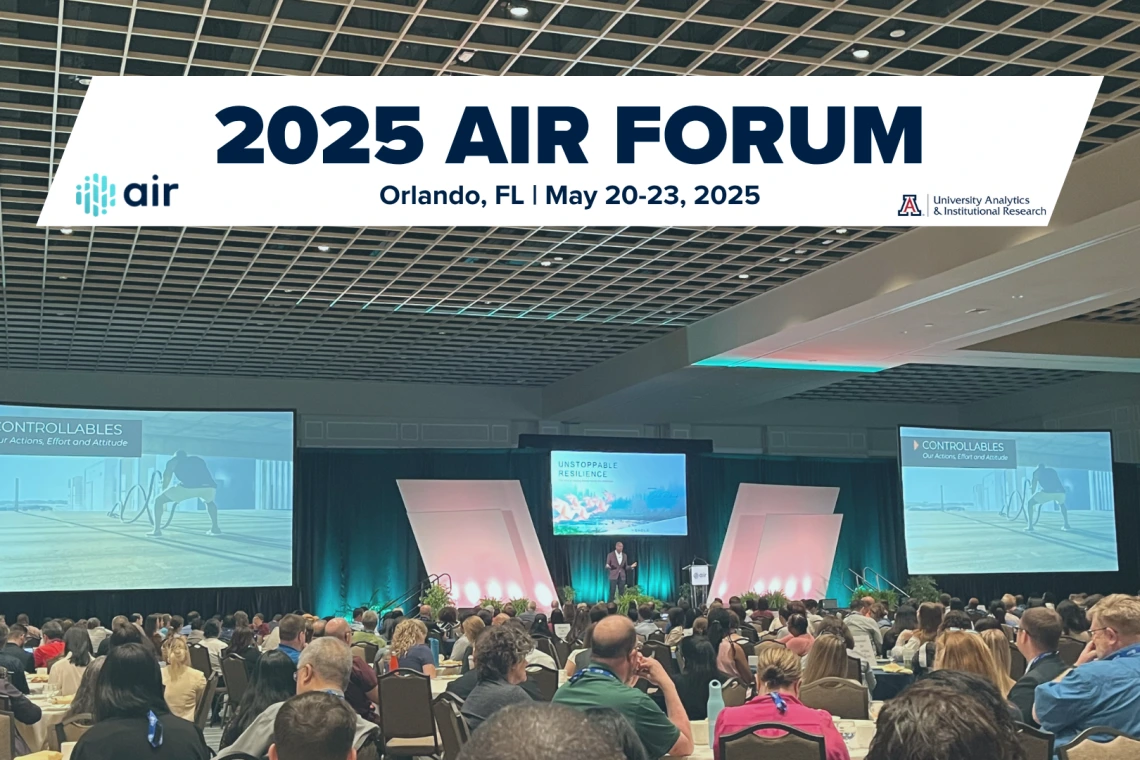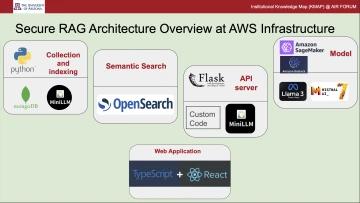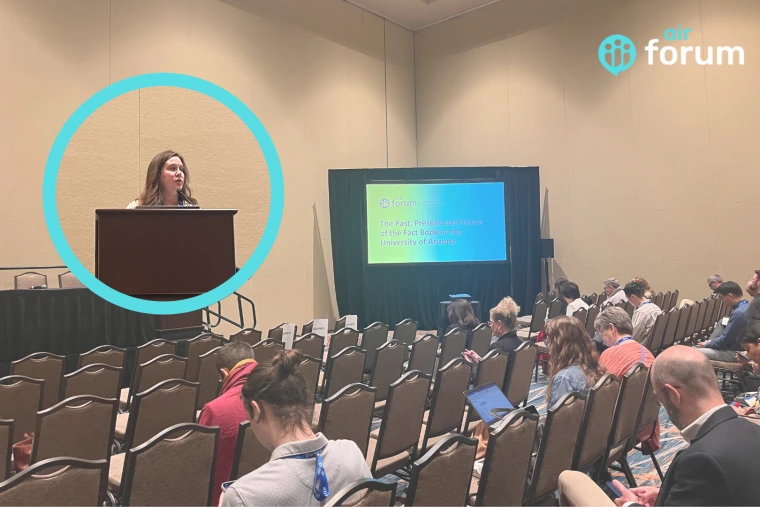UAIR Represents the University of Arizona at the 2025 AIR Forum

Shola Richards, award-winning author and AIR Forum Keynote Speaker, addressed attendees about unstoppable resilience and the keys to staying strong during any challenge.
At the end of May, several members of the UAIR team traveled to Orlando, Florida, to participate in the 2025 Association for Institutional Research (AIR) Forum—the annual gathering for higher education professionals committed to fostering data-informed decision-making cultures. With attendees and higher education institutions visiting from across the country and around the globe, the forum served as a vibrant hub for knowledge exchange, collaboration, and innovation in institutional research (IR). Sessions underscored the growing responsibility of IR professionals to lead ethical, strategic data use that not only informs but transforms higher education.
UAIR’s attendance at the AIR Forum was a valuable opportunity to engage with peers and higher ed leaders who share the University of Arizona’s commitment to building an impactful data culture. A key takeaway was the recognition of IR departments as essential campus partners—uniquely positioned to move beyond traditional analytics by developing narratives that resonate with decision-makers and tell our institution’s story.
One-Day Census Turnaround: Revolutionizing Fall Reporting at the University of Arizona
Rico Silva, Program Manager and Daisy Esquivel, Data Analyst from UAIR’s Student Data Team, delivered a featured session that detailed the University of Arizona’s evolving Student Census process. Silva opened the session with the University and UAIR’s mission to support student success, setting the stage for a deep dive into one of the most critical data reporting efforts of the academic year. Esquivel then walked attendees through the historical transformation of the Student Census process. What started as a manually maintained, time-consuming process handled by a single individual grew into a one-day snapshot and reporting process supported by cross-team collaboration and months of preparation. Attendees gained insight into the real-time value of this work. The U of A Student Census Report directly supports leadership decisions, enrollment strategies, compliance efforts, and public communications. As Esquivel’s formal debut on the national conference stage, this session also highlighted the importance of professional development. UAIR’s data analysts can contribute their expertise while learning from and connecting with institutional peers across the country.
Sharing our Student Census process at AIR was such a rewarding experience. It was exciting (and a little nerve-wracking) to present, but it was incredible to connect with so many professionals who were genuinely interested in our work and seeing how our efforts resonate beyond our own campus - Daisy Esquivel, Data Analyst
Deploying Secure RAG Systems: Generative AI for Higher Education

Iqbal Hossain, Director of Research Data Science for the Knowledge Map (KMap), led a compelling session at the AIR Forum that explored the innovative use of Retrieval-Augmented Generation (RAG) AI technology. Showcasing ASK-KMAP, a research query tool embedded within KMap, Hossain demonstrated real-world use cases that allow users to interact with university research data in dynamic new ways. This includes discovering researchers' expertise, exploring facilities and resources, identifying UA patents, and navigating the broader research landscape. Hossain’s session drew in an engaged audience eager to learn how this technology enhances research data accessibility through context-aware, programmatically generated responses that go beyond simple search results.
The Past, Present, and Future of the Fact Book at the University of Arizona
Lastly, Ashley Hurand, Director of UAIR, led an insightful session on the evolution of the institutional fact book, highlighting both its history and current practices at the University of Arizona. Tracing its roots from Florida State University’s 1968 hand-typed booklets to today’s interactive online dashboards, Hurand illustrated how the fact book has adapted to meet changing institutional needs while maintaining its core functions—supporting data-driven decision-making, planning, self-study, and communication. Attendees were especially interested in the preview of “Ask IFB,” an AI-powered feature in very early development (“alpha” phase) that would allow users to query the fact book and receive immediate, context-aware responses. The session demonstrated how tradition and innovation can work together to enhance the accessibility and impact of institutional data.

UAIR’s strong presence at the 2025 AIR Forum underscored our commitment to advancing the role of institutional research through innovation, collaboration, and professional development. From sharing the evolution and real-time impact of our Fall Census process, to exploring the future of fact books and the integration of AI in research data access, our team showcased how thoughtful, data-informed strategies can drive institutional success. As we return to campus, we bring with us new insights and a renewed dedication to supporting the University of Arizona through purposeful use of data.
